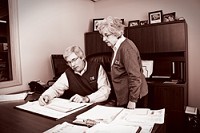While the economic downturn has brought challenges for many businesses, it brought opportunities for growth to Midwest Metro.
The company, owned by Charles and Anne Nelson, works with mortgage holders to preserve and protect properties that are in foreclosure.
According to data from RealtyTrac’s 2010 U.S. Foreclosure Market Report, more than 3.8 million foreclosure filings – default notices, scheduled auctions and bank repossessions – were reported on a record 2.9 million U.S properties last year, up 2 percent from 2009 and 24 percent from 2008.
The report also found that 2.23 percent – or one out of every 45 – of all U.S. housing units received at least one foreclosure filing in 2010.
For Midwest Metro, the uptick in foreclosures resulted in an increase in client orders to nearly 60,000 in 2010, up from 42,000 in 2009, Vice President Charles Nelson says, for a client base that includes BAC Field Services, CoreLogic and MFI Field Services. The company posted 2010 revenues of $7.8 million, up 159 percent from 2008.
“In our business, growth can come from three ways: your existing clients provide work, you find new clients or you expand your coverage area for either new or existing clients,” Nelson says.
Midwest Metro helps its clients handle evictions, winterize vacant homes and implement initial security measures when properties first become vacant to prevent squatters.
“Our function is to maintain the property, not only for the mortgage holder, but also for the neighborhood,” Nelson says.
Midwest Metro has 18 local employees on its payroll, with 17 of those full time. Its network of subcontractors however, fluctuates seasonally from 125 to 175, with more people at work during the summer months when Midwest Metro must cut about 1,000 lawns a month.
Nelson notes, however, that Midwest Metro isn’t just focused on making properties look pretty.
“(We) are also preserving the property values around (them), and you want that property to avoid becoming a health and safety hazard for the community,” he says.
Midwest Metro’s service footprint covers Missouri, Arkansas, Illinois, Kansas, Oklahoma and Tennessee.
“Our clients have very exact standards to which we are expected to work,” Nelson says. “It is imperative that we meet the tight time frames within defined guidelines of performance, which are defined in large part by Department of Housing and Urban Development, mortgage letters and client and lender expectations.”
When Nelson and his wife, who is company president, bought Midwest Metro in 2008 from former owners Bryan and Jessica Cates, they were unfamiliar with the foreclosure industry. Nelson credits Cates, who founded the company in 2001, with providing valuable mentorship during and after the transaction. He says some of the employees who remained after the sale helped the new owners form a foundation on which to build.
“I think what Anne and I brought to the business was management oversight and ability to delegate responsibilities,” he says.
When the Nelsons came on board, all work orders arrived via fax and were manually sorted and faxed to contractors in the company’s network, Nelson says, but that has changed in the years since.
“Our first charter to our director of operations was to determine if there was a system that would provide us enterprise-wide capability, which means it handles the order entry, distribution, processing and resubmission to the client, as well as tracking the business side and the invoices,” Nelson says.
Now, an East Point Systems software package, called Field-Comm, processes Midwest Metro’s work orders, according to Director of Operations Tyler Danalds, who notes that Field-Comm eliminates the redundancy of multiple proprietary systems.
Nelson says Midwest Metro has evolved to a virtual business rather than a paper-dependent one, with just a single hard copy for each work order. Based on his expectations for the future, the time and paper savings that come from that change are likely to come in handy.
“We are forecasting a minimum of 12 percent to15 percent growth this year,” he says.
Click here for the complete 2011 Dynamic Dozen overview.[[In-content Ad]]
